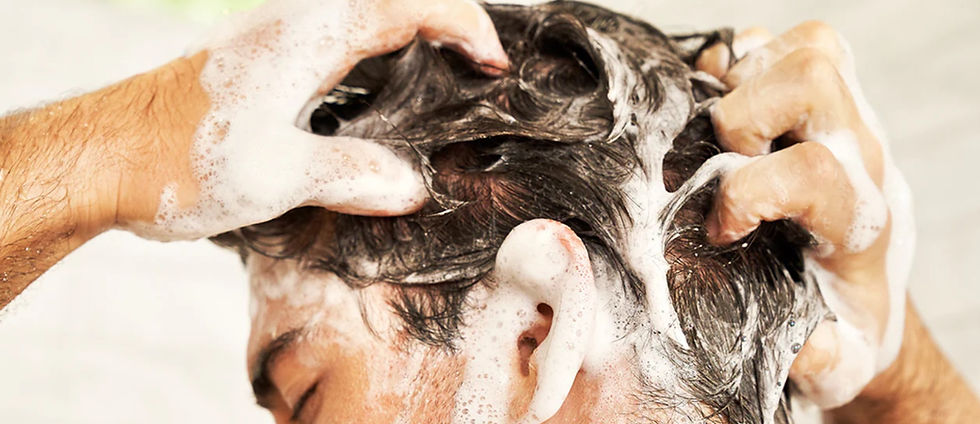Hair Conditioners - Overview
- Dec 5, 2024
- 4 min read
Updated: Jul 21, 2025
Hair conditioners are essential hair care products used to improve the texture, appearance, and manageability of the hair after shampooing. They help restore moisture, detangle, and smooth the hair, making it softer, shinier, and easier to style. Conditioners are formulated with ingredients that help replenish the moisture lost during washing and provide various other benefits based on different hair needs.
Types of Hair Conditioners and Their Uses:
Regular Conditioner:
Purpose: To moisturize, detangle, and soften the hair after shampooing.
Best for: Most hair types, especially those in need of general hydration and smoothness.
Use: Applied after shampooing, left for a few minutes, and rinsed out. It helps to maintain moisture and smooth the hair shaft.
Leave-In Conditioner:
Purpose: To provide continuous hydration and detangling benefits without rinsing out.
Best for: Dry, frizzy, or curly hair, or anyone needing extra moisture or protection.
Use: Applied to damp hair and left in without rinsing. It helps with moisture retention, detangling, and providing shine throughout the day.
Deep Conditioner/Conditioning Mask:
Purpose: To offer intensive moisture, repair, and nourishment, often used for more damaged hair.
Best for: Dry, damaged, over-processed, or color-treated hair.
Key Ingredients: Rich emollients like shea butter, oils (argan, coconut), and proteins.
Use: Applied after shampooing, left for 10–30 minutes, and then rinsed out. It helps to deeply hydrate and repair the hair, providing long-lasting softness and strength.
Rinse-Out Conditioner:
Purpose: To smooth and condition the hair after shampooing, making it easier to detangle.
Best for: Normal to dry hair.
Use: Applied to wet hair after shampooing, left for a few minutes, then rinsed off. This is the most common type of conditioner.
Color-Protecting Conditioner:
Purpose: To preserve and enhance the vibrancy of color-treated or dyed hair while providing moisture.
Best for: Color-treated hair.
Key Ingredients: UV filters, antioxidants, and mild cleansers that help protect color from fading.
Use: Applied to colored hair to prevent color from washing out and to keep the hair moisturized and healthy.
Anti-Frizz Conditioner:
Purpose: To smooth the hair and reduce frizz, especially in humid conditions.
Best for: Frizzy, wavy, or curly hair.
Key Ingredients: Silicones, oils, and proteins that help seal the hair cuticle and lock in moisture.
Use: Applied after shampooing to control frizz and enhance smoothness.
Volumizing Conditioner:
Purpose: To add volume and body to fine or limp hair.
Best for: Thin or flat hair.
Key Ingredients: Lightweight moisturizers and volumizing agents, like hydrolyzed proteins or panthenol.
Use: Applied to hair to provide volume and fullness without weighing the hair down.
Clarifying Conditioner:
Purpose: To remove buildup from hair products, pollutants, and excess oil.
Best for: Oily hair or hair exposed to product buildup.
Key Ingredients: Mild cleansers or detoxifying agents like charcoal or apple cider vinegar.
Use: Often used once a week or as needed to clarify the hair, removing residue left by styling products or hard water minerals.
Protein Conditioner:
Purpose: To strengthen and repair damaged hair by replenishing lost proteins.
Best for: Weak, brittle, or over-processed hair.
Key Ingredients: Keratin, silk proteins, or amino acids.
Use: Applied to hair to rebuild and reinforce the hair shaft, improving elasticity and reducing breakage.
Co-Wash Conditioner (Conditioner Wash):
Purpose: To cleanse and condition hair in one step, ideal for curly or textured hair.
Best for: Curly, dry, or coily hair.
Key Ingredients: Gentle surfactants and moisturizing ingredients, often without sulfates.
Use: Applied in place of shampoo, co-washes cleanse the scalp while providing conditioning benefits, making them perfect for people who wash their hair less frequently.
Benefits of Using Hair Conditioner:
Moisture Restoration:
Conditioners replenish moisture lost during shampooing, helping to keep hair hydrated and soft.
Detangling and Softening:
Conditioners make it easier to comb through hair by reducing tangles and making the hair smoother and more manageable.
Shine and Smoothness:
Regular use of conditioner helps hair look shinier and more polished by smoothing the cuticle (outer layer of the hair shaft).
Improved Hair Strength:
Many conditioners contain proteins and strengthening agents that help reduce breakage and improve the overall strength of hair.
Frizz Control:
Anti-frizz conditioners smooth the cuticle, helping to control frizz and giving the hair a sleeker appearance.
Color Protection:
Color-protecting conditioners help preserve the vibrancy of color-treated hair, preventing fading and dryness.
Damage Repair:
Deep conditioners and protein-rich formulas can repair hair damage caused by heat styling, chemical treatments, or environmental factors.
How to Use Hair Conditioner:
Shampoo First: Begin by washing your hair with shampoo to remove dirt, oils, and buildup.
Apply Conditioner: Squeeze out excess water from your hair, then apply the conditioner to the lengths and ends of your hair (avoid the scalp if you have oily hair).
Leave In: Let the conditioner sit on your hair for a few minutes, especially if it's a deep conditioner or treatment.
Rinse: Thoroughly rinse out the conditioner with cool or lukewarm water to help seal the hair cuticle.
Who Should Use Hair Conditioners?
Everyone with Hair: Most people benefit from using conditioner, especially if they want soft, shiny, and manageable hair.
People with Dry or Damaged Hair: Those with dry, frizzy, or damaged hair can benefit from moisturizing or repairing conditioners.
Color-Treated Hair: Color-treated hair requires conditioners that protect and preserve color.
Curly or Coily Hair: These hair types often require more intense hydration and detangling, making leave-in conditioners and deep conditioners helpful.
Hair conditioners are essential for maintaining healthy, soft, and manageable hair. By choosing the right type of conditioner for your hair's unique needs, you can improve moisture levels, control frizz, repair damage, and enhance the overall health and appearance of your hair.


Comments